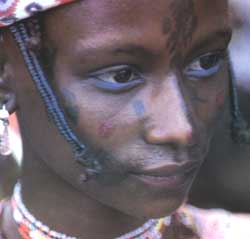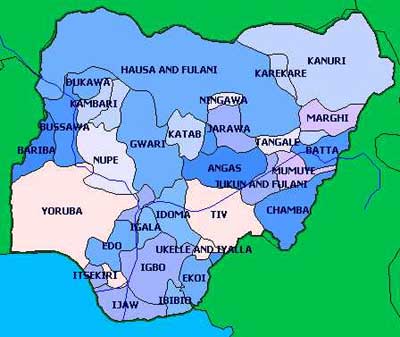
THE HAUSA AND FULANI
 As the name suggests, the Hausa/Fulani are
two ethnic groups which were formerly distinct but are now for all practical
purposes intermixed to the extent of being regarded as one inseparable ethnic
nation. Although found throughout the grassland belt of West Africa, the bulk of
the Hausa/Fulani population is concentrated in Northern Nigeria especially in
and around the urban centres of Sokoto, Kano and Katsina which were important
market centres on the southern section of the trans-Saharan caravan trade routes
in the past.
As the name suggests, the Hausa/Fulani are
two ethnic groups which were formerly distinct but are now for all practical
purposes intermixed to the extent of being regarded as one inseparable ethnic
nation. Although found throughout the grassland belt of West Africa, the bulk of
the Hausa/Fulani population is concentrated in Northern Nigeria especially in
and around the urban centres of Sokoto, Kano and Katsina which were important
market centres on the southern section of the trans-Saharan caravan trade routes
in the past.
The Hausa had established well organised city
states before the advent of the Fulani. These states included Katsina, Daura,
Kano Zazzau (Zaria), Biram, Gobir and Borno. Some of these were conquered and
re-established by the Fulani. A few other kingdoms such as Katagum, Hadejia and
Gombe were founded.
The coming of the Fulani into Hausaland resulted in significant changes in the
area. They brought the full force of Islam which became a great factor of social
life and culture. In education, dress, taste and outlook, the Hausa and their
Fulani conquerors became part of the Islamic culture world. This influence
remains till today.
Many Hausa people continue to be subsistence farmers, with a few practising
mixed farming. Others are skilled craftsmen, such as leather workers. The Fulani
on the other hand comprise’ ruling dynasties, semi-sedentary farmers, settled
farmers, but in the main pastoralists.
Today, Hausa/Fulani influence has spread over much of the culture areas to its
immediate south where the Hausa language has become important.

Ricerca Ing. F.P. Di Giacomo - Dati e cartografia in internet: Alpha Consult S.r.l - Web: G. Cerica |
|||